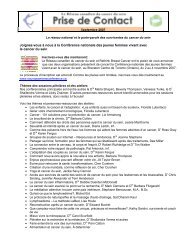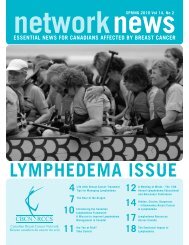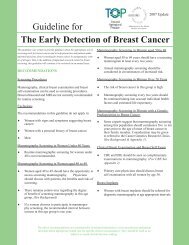Network News - Winter/Spring 2010 - Canadian Breast Cancer ...
Network News - Winter/Spring 2010 - Canadian Breast Cancer ...
Network News - Winter/Spring 2010 - Canadian Breast Cancer ...
You also want an ePaper? Increase the reach of your titles
YUMPU automatically turns print PDFs into web optimized ePapers that Google loves.
people to give this information to<br />
other family members who may be at<br />
risk for cancer and who may benefit<br />
from genetic testing. Having genetic<br />
information can pose challenges for<br />
many people who may not be close to<br />
relatives or those who have relatives<br />
living a great geographical distance<br />
away. How does one begin to inform<br />
these individuals? Should it be a<br />
telephone call or a letter? How does one<br />
breach the topic of cancer? Individuals<br />
may fear that they will cause the<br />
relative to become emotional or have<br />
challenges in even describing and giving<br />
out complex genetic terms or their<br />
associated implications.<br />
Other challenges include the<br />
implications for the relevance of the<br />
genetic information for a person’s<br />
children. Most parents will want to<br />
inform their children that they are<br />
eligible for genetic testing at some<br />
stage; however, important questions<br />
need to be considered: How do I tell<br />
my daughter or son? At what age<br />
should I inform them? How will they<br />
react? How much should I tell them?<br />
Should I wait until they are at the age<br />
of screening? Understandable concerns<br />
include the potential reactions of a<br />
child and whether or not he or she<br />
will be able to handle the news. Other<br />
common concerns include the feeling<br />
that one is holding on to information<br />
until feeling prepared to disclose it,<br />
which can result in a person feeling<br />
less open or even feeling a sense that<br />
he or she has secret knowledge.<br />
Options information<br />
follow test results<br />
Following the news of the test<br />
result, individuals are typically<br />
given information on a number of<br />
options to consider in managing his<br />
or her risk, including the need for<br />
multiple screening tests to monitor<br />
health (mammograms, ultrasounds,<br />
MRIs), and the option of prophylactic<br />
surgeries (prophylactic mastectomies<br />
or prophylactic oopherectomy). These<br />
are very personal decisions, and even<br />
within families it is not uncommon for<br />
siblings to choose different options.<br />
For some women, the recommendation<br />
of being followed through high risk<br />
screening programs is sufficient<br />
and they can manage the associated<br />
anxiety that occurs when going for<br />
checkups. Other women feel that<br />
prophylactic surgery is the best choice<br />
for them in managing their cancer risk.<br />
The decision-making around these<br />
preventive and monitoring options<br />
can be challenging and leave a woman<br />
feeling unclear and uncertain as to<br />
which choice is best for her.<br />
While all women clearly want to<br />
lower their cancer risk, there is a<br />
fundamental difference between<br />
making a choice to have surgery<br />
when in good health and having<br />
surgery once disease is detected. When<br />
making these challenging decisions,<br />
it is important for women to have<br />
opportunities to explore their personal<br />
pros and cons, value systems and to<br />
gain a clearer understanding about<br />
which options seem best suited for<br />
them. There can be significant value<br />
in working through these decisions<br />
with a healthcare professional such<br />
as a mental health professional, a<br />
nurse, or with her genetic counsellor.<br />
Women adjust more optimally to their<br />
decisions when they feel as though<br />
they were fully informed, had taken<br />
the time to consider their options, had<br />
opportunities to explore their views,<br />
understood the implications and<br />
potential results and side effects, and<br />
felt ready to make them.<br />
Regardless of how well-informed<br />
a woman feels, it is important to<br />
recognize that along with the challenges<br />
around medical decisions, there will<br />
be emotional and physical implications<br />
that require time and an adjustment<br />
period. Again, these reactions are<br />
important to recognize as a normal part<br />
of the process. Surgeries which alter<br />
functioning and physical appearance or<br />
sensation will result in changes to body<br />
image and feelings about oneself, and<br />
can affect self-esteem and require some<br />
time to adjust to.<br />
Common emotional reactions include<br />
feelings of anxiety prior to having<br />
surgery, feelings of sadness, loss and<br />
a need to mourn the loss of the prior<br />
physical self. It takes time for the<br />
woman to become familiar with her<br />
new sense of self. Women who feel<br />
that they are overwhelmed with these<br />
emotional reactions or believe that<br />
the adjustment period may be taking<br />
too long should consider seeking<br />
professional help from a counsellor,<br />
meeting with other women in similar<br />
situations through peer support or<br />
support groups, or look for relaxation<br />
and meditation techniques to manage<br />
stress levels and emotional reactions.<br />
The changes that occur as a result of<br />
surgeries can also have implications<br />
for intimate relationships. Sometimes<br />
it is difficult for partners to understand<br />
how to assist a woman in her<br />
adjustment, or couples may find it<br />
challenging to openly discuss their<br />
perspectives and fears surrounding<br />
the changes or their own personal<br />
reactions. For example, women can<br />
feel like they have lost their sense of<br />
femininity or that they have lost the<br />
ability to perform a certain role (e.g.<br />
reproductive roles). They may feel<br />
“different” or even older. Some find<br />
themselves with a lower libido if they<br />
have entered into menopause. Most<br />
women work successfully through<br />
these feelings alone or with their own<br />
supports, but health professionals or<br />
counsellors can be helpful in assisting<br />
women or couples to navigate these<br />
emotional challenges. Following their<br />
adjustment periods, most women<br />
feel satisfied that they made the right<br />
decision and benefit through the<br />
comfort provided by having a lower<br />
risk for cancer as a result of the choice<br />
they made.<br />
Other challenges around surgery<br />
involve discussions with children<br />
to inform them that their mother is<br />
24 <strong>Network</strong> <strong>News</strong> <strong>Winter</strong>/<strong>Spring</strong> <strong>2010</strong>














